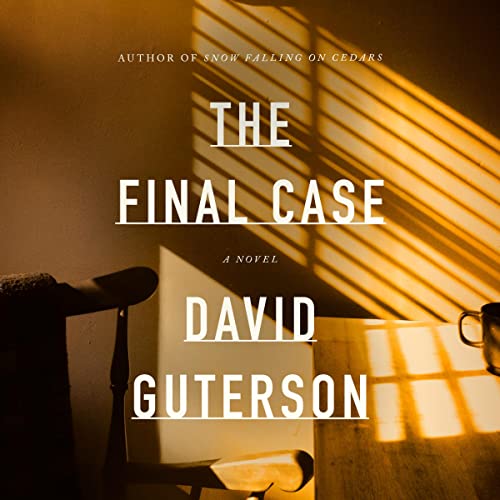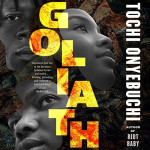- Book Reviews THE SHOCK OF THE LIGHT by Lori Inglis Hall
- Book Reviews THE VIOLIN MAKER’S SECRET by Evie Woods
- Book Reviews THE DANGER OF SMALL THINGS by Caryl Lewis
- Book Reviews NONESUCH by Francis Spufford
- Book Reviews LADY TREMAINE by Rachel Hochhauser
- Book Reviews THE ASTRAL LIBRARY by Kate Quinn
- Book Reviews THE HARD LINE, A Gray Man Novel (Gray Man series, Book 15) by Mark Greaney
- Children's Book Reviews THE NUTCRACKER by E.T.A. Hoffman
- Children's Book Reviews RANGE: HOW EXPLORING YOUR INTEREST CAN CHANGE THE WORLD by David Epstein
- Children's Book Reviews CHICKA CHICKA BOOKS: I LOVE DAD AND TRICKA TREATA

THE FINAL CASE by David Guterson
Intertwined in this amazing literary novel set in Seattle is a powerful criminal court case involving child abuse of by a strict deeply religious Christian family of their adopted daughter from Ethiopia; a family memoir with reflections on the complex, loving relationships between son, mother, father, sister, and wife that verge on poetic glimpses; and a deep reflection by the author about being a novelist in the guise of the fictional novelist telling the story.
The adoptive family, the Harveys, embody the worst of the far Christian right. They often go off on extremist tirades about government cabals, conspiracies, hatred of all minorities who they believe have ruined America for whites, Biblical pronouncements from a husband’s natural dominance over a wife to child punishment, and child protective services being out to get them. They increasingly and harrowingly punish their adopted Ethiopian daughter for her lack of obedience. They have no regrets or apologies for their actions, only a blazing religious self-righteousness. Turns out the Harvey’s own children, once moved into protective care, have post-traumatic stress disorder from their parent’s tortuous demands for perfection and total compliance, as well as harsh discipline.
The narrator is a once successful novelist who has written anything in a decade. His 83-year-old Dad, Royal, is a renown and mostly retired criminal defense attorney who continues to take on pro bono assignments out of dedication to the system, rather than any loyalty to the mostly guilt defendants he ends up representing. Capturing a generation who worked hard, the aging Dad carries his cereal, bowl, and spoon with him every day — going out to buy milk and a banana and coffee to round breakfast out. His son takes on the role of chauffeur, as his Dad can no longer drive safely, chief investigator, and life chronicler. His side-by-side interactions with his Dad infuse him with reflections that clearly become the base for his new novel, which seems to be this novel we’re reading.
The book rings so true to what seems to be Guterson’s life as a novelist, as well as a real criminal trial, that you cannot help but feel you’re being swept up into a powerful memoir lightly glazed as fiction. So much so, that the book had me scrambling to Google to find the parallels, which abound. Guterson grew up in Seattle during the 1990’s, his father as the dad in the novel was a locally celebrated criminal lawyer, he married his wife in 1979 and they home-schooled their children. There was a real child abuse murder case involving a girl who had been adopted with the same group in which Guterson and his wife adopted an Ethiopian girl. So the circumstances of her abuse resonated deeply, and Guterson followed closely the criminal trial of her adoptive parents.
Much of the narrator’s musing focus on the art and struggle of being a novelist. The narrator a stalled fiction writer, and this book in a diary format jump starts his novel writing. There are multiple encounters with has-been authors, aspirational but stalled novelists, and all tropes in between in the world of fiction writers. The narrator shares that as a novelist deciding which bits should make it into the final novel, “naturally my mind edited these variegated scribblings, pruning and grooming erratic dross.” There are musing about famous novelists and their sayings, from provocative one-liners that his sister posts on the chalkboard in her tea shop.
Such a moving, outstanding read- and worth the ten-year wait from the publication of Snow Falling on Cedars!
Thanks to Knopf DoubleDay and NetGalley for an advanced reader’s copy of this book.
-
 THE SHOCK OF THE LIGHT by Lori Inglis Hall
THE SHOCK OF THE LIGHT by Lori Inglis Hall
-
 THE VIOLIN MAKER’S SECRET by Evie Woods
THE VIOLIN MAKER’S SECRET by Evie Woods
-
 THE DANGER OF SMALL THINGS by Caryl Lewis
THE DANGER OF SMALL THINGS by Caryl Lewis
-
 NONESUCH by Francis Spufford
NONESUCH by Francis Spufford
-
 LADY TREMAINE by Rachel Hochhauser
LADY TREMAINE by Rachel Hochhauser
-
 THE ASTRAL LIBRARY by Kate Quinn
THE ASTRAL LIBRARY by Kate Quinn














